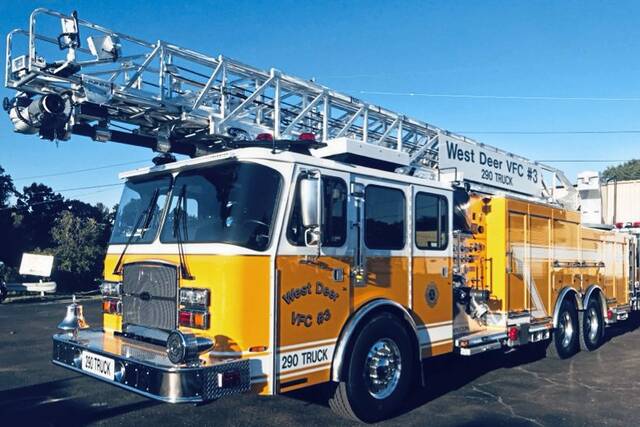What does West Deer’s fire tax referendum mean for voters?

West Deer voters will see two additional questions on their ballots on Election Day — one regarding the township’s fire tax, and the other for elected auditors.
West Deer is a Home Rule charter community, meaning it is governed by a charter that can only be amended through a voter referendum. Currently under the charter, township homeowners pay $40 per year per household and each business pays $100 per year for fire protection, township Manager Daniel Mator said.
But since that rate was approved by voters in a 2005 referendum, costs for vehicles and other materials have increased, Mator said.
A fire study revealed the companies were able to cover operational costs such as utilities, training, fuel, vehicle and building maintenance, firefighting equipment and hoses, but they were not able to save enough to cover the capital costs of future vehicles, Mator said.
Voting yes on the referendum would enable supervisors to change the fire tax rate from a flat fee to a millage rate. Depending on people’s assessed property value, some township property owners would see reductions in their fire tax or an increase in their fire tax.
The average property assessment in West Deer is $117,600. Under a half-mill fire tax, that homeowner would pay $58.80 a year for fire protection, Mator said.
If approved, the fire tax would not exceed a half-mill. That would give West Deer’s three volunteer fire departments about $132,000 each. They currently get about $75,000 each, Mator said.
“This would increase the amount we get, which would be helpful,” said Aaron Skrbin, president of West Deer Volunteer Fire Company No. 3. “The cost of fire services has increased exponentially over the years.”
Because of the Home Rule charter, Mator said, the fire tax limits can only be modified by the voters, not the board itself.
“The charter tells the board they have to send it to the voters. It’s a question of what they’re required to do, by law,” Mator said.
If voters pass the fire tax increase, those revenues would only go toward operating expenses and capital vehicle purchases for the fire departments.
“The board’s intent in putting this to the voters was to ensure that the three fire departments had enough to operate off of and for future capital vehicle purchases,” Mator said.
What a fire tax wouldn’t pay for
The fire tax money would not go toward company No. 3’s new building on Route 910. That, Skrbin said, will be paid off by grants and fundraisers.
There also is a misconception that the fire tax would cover costs for the new township building, Mator said.
The fire tax would only go toward fire protection, he said.
In 2004, fire companies and the township argued that if a fire tax was implemented, the departments would not have to rely on a fluctuating revenue source decided by different supervisors each year, according to township documents.
The fire tax referendum passed the following year in an effort to ensure a stable and set funding source for the fire companies each year.
The general fund is budgeted separately by the board knowing that the township’s fire service funding comes from the fire tax.
Coming in 2024: General fund tax decrease
Mator said a draft of the township’s 2024 general fund budget is showing a millage rate decrease, which would offset a portion of a fire tax increase if the referendum passes. It wouldn’t be enough to completely offset the entire fire tax increase, but it would help, he said.
Adam Olszewski, president and deputy fire chief of company No. 2, shared a letter from all three departments sent to township residents urging their support of the ballot question.
“The number and types of (emergency) calls have risen, and continue to rise, as the township continues to grow,” the letter said. “The rigor and time required to train continually increases as requirements and national standards change and the nature of emergency responses evolve. Like everything else, the cost of maintenance relentlessly climbs with each passing year, made worse by the recent challenges of the covid-19 pandemic and staggering inflation.”
The letter gave an example of how a new fire engine 20 years ago would have cost $324,000, but today would cost more than $750,000.
The companies acknowledge in the letter that fundraisers will continue because the proposed fire tax increase won’t cover all costs, but the “hope is that additional public funds will alleviate some fundraising needs though will not eliminate them.
“Raising taxes is never easy or wanted. The volunteers asking for this increase will also be responsible for paying the tax along with you. Without the increase, the long-term viability of a volunteer fire service in West Deer Township is not sustainable,” the letter said.
The township also hopes the referendum passes.
“The board wants to work with the fire companies, not against them,” Mator said.
Elected auditors
Township voters also will be able to decide on the continuation of elected auditors.
Currently, West Deer’s charter calls for elected auditors, Mator said. The elected auditor positions started in 1976, but times have changed since then, and government financial reporting has gotten more complex, he said.
For the past 20 years, the township has appointed an independent, municipal auditing firm to complete the audit. Although elected auditors occasionally show up on the ballots, they do not complete the audit, Mator said.
Often, the township has no elected auditors.
Voting yes on the ballot question would not change anything process-wise, Mator said, but it would eliminate the confusion of having the position of elected auditors on the ballot.
Kellen Stepler is a Tribune-Review staff writer. You can contact Kellen by email at kstepler@triblive.com or via Twitter .

